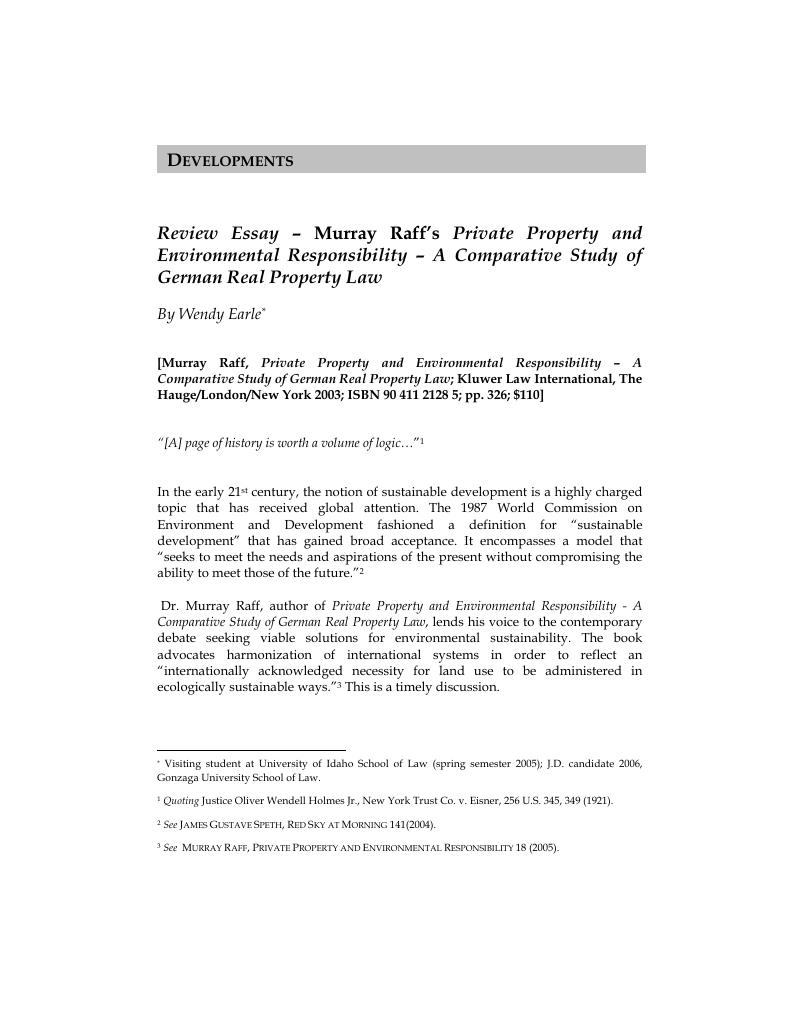No CrossRef data available.
Published online by Cambridge University Press: 06 March 2019

1 Quoting Justice Oliver Wendell Holmes Jr., New York Trust Co. v. Eisner, 256 U.S. 345, 349 (1921).Google Scholar
2 See James Gustave Speth, Red Sky at Morning 141(2004).Google Scholar
3 See Murray Raff, Private Property and Environmental Responsibility 18 (2005).Google Scholar
4 Id. at 267.Google Scholar
5 See, e.g. Goble, Dale D., Solar Rights: Guaranteeing a Place in the Sun, 57 Oregon L. Rev. 94 at 104 (1977).Google Scholar
6 In all fairness to the author it must be noted that Raff is a law professor at an Australian University and is not expected to have complete knowledge of common law theories and developments underlying American property law.Google Scholar
7 Raff, , supra note 3, at 5.Google Scholar
8 See National Audubon Society v. Superior Court, 658 P. 3d 709 (1983) (where the Court held that a city's vested water rights were subject to reexamination in order to protect the public trust in human and environmental uses in Mono Lake).Google Scholar
9 Raff, , supra note 3, at 9 (identifying only fifteen states that recognize the land registration system).Google Scholar
10 See, e.g. Fillmore W. Galaty et al., Modern Real Estate Practices (14th ed., 1996) “ The Torrens system is currently in use in fewer than ten states, and some of these state are in the process of phasing out Torrens registration altogether. Consult your state's law to determine whether the Torrens system is active in your area….” quoting the 435 page educational manual that is the standard teaching tool for real estate agents preparing for licensing exams. This is the sole mention of practice procedures for title transfers under the Torrens system.Google Scholar
11 See, e.g. I Melvin I. Urofsky & Paul Finkelman, A March of Liberty 252 (2d ed., 2002) “…[S]ettlers viewed land as a commodity to buy, sell or trade…Americans…demanded a law that permitted them to exploit the one resource they had in abundance.” See also Charles Szypszak, Public Registries and Private Solutions: An Evolving American Real Estate Conveyance Regime, 24 Whittier L. Rev. 663 (2003).Google Scholar
12 Raff, , supra note 3, at 61-62.Google Scholar
13 Id. at 87.Google Scholar
14 See Esposito, Antonio, A Comparison of the Australian (“Torrens”) System of Land Registration and the Law of Hamburg in the 1850's, 7 Australian J. Leg. Hist. 193 (2003).Google Scholar
15 See Blacks Law Dictionary 712 (7th ed. 1999) “Torrens system: system for establishing title to real estate in which a claimant first acquires an abstract of title then applies to court for issuance of title certificate which serves as conclusive evidence of ownership.”Google Scholar
16 See Esposito, Antonio, Ulrich Hűbbe's Role in the Creation of the “Torrens” System of Land Registration in South Australia, 25 Adelaide L. Rev. 215 (2004); See also Antonio Esposito, Die Entstehung des australischen Grundstücksregisterrrechts (Torrentsystem) – eine Rezeption Hamburger Partikularrechts? (2005).Google Scholar
17 See Raff, , supra note 3, at 40.Google Scholar
18 Id. at 58.Google Scholar
19 See Urofsky & Finkelman, supra note 11, at 15.Google Scholar
20 Id.Google Scholar
21 See id.Google Scholar
22 See I Melvin I. Urofsky & Paul Finkelman, Documents of American Constitutional and Legal History 27 (2d ed., 2002).Google Scholar
23 Gary Mcdowell, 11 The Constitution And Contemporary Constitutional Theory 718 (1985).Google Scholar
24 See Black's Law Dictionary 948 (7th ed. 1999).Google Scholar
25 Raff, , supra note 3, at 156.Google Scholar
26 Id. at 157.Google Scholar
27 Id. at 136.Google Scholar
28 Id. at 162.Google Scholar
29 Id. at 169.Google Scholar
30 Id. at 165.Google Scholar
31 Id. at 173-174.Google Scholar
32 See, e.g. id. at 194.Google Scholar
33 See id. at 210-268 (for an inclusive discussion of the Grundbuchverfuegung [laws and regulations], which control the land title registration system).Google Scholar
34 See id. at 211- 212 (explaining that “[t]he entire area of Germany has been divided into cadastral units, which are recorded in the land information Cadastre according to identification codes.”) A cadastre can be compared to a plat map used in the American property system, which is most often based on a survey and is used to define “property descriptions…by referring to the appropriate map.” See also Blacks Law Dictionary 939 (7th ed. 1999)Google Scholar
35 See Raff, , supra note 3, at 266. (discussing the notions of “apparent right” and “true position of right”).Google Scholar
36 Id.Google Scholar
37 See Jon Bruce, Real Estate Finance 180 (2004) (discussing recording statutes). See also E-Z Review for Property 66 (Randy J. Riley, Esq. et al. eds. 2002) (explaining that recording statutes work “[t]o give notice to all other prospective purchasers of real estate…”).Google Scholar
38 E-Z Review for Property 66 (Randy J. Riley, Esq. et al. eds. 2002).Google Scholar
39 See Urofsky & Finkelman, supra note 22, at 210.Google Scholar
40 Id. at 185-188, 215, 232.Google Scholar
41 See, e.g. National Audubon Society v. Superior Court, 658 P.2d 709 (1983).Google Scholar